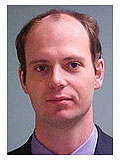Rod Johnson, SpringSource

Rod is the father of Spring. The Spring Framework open source project began in February 2003, based on the Interface21 framework published with Rod's best-selling Expert One-on-One J2EE Design and Development.
Rod is one of the world's leading authorities on Java and J2EE development. He is a best-selling author, experienced consultant, and open source developer, as well as a popular conference speaker.
Rod's best-selling Expert One-on-One J2EE Design and Development (2002) was one of the most influential books ever published on J2EE. The sequel, J2EE without EJB (July 2004, with Juergen Hoeller), has proven almost equally significant, establishing a comprehensive vision for lightweight, post-EJB J2EE development.
Rod has extensive experience as a consultant in a wide range of industries: principally, finance, media and insurance. He has specialized in server-side Java development since 1996. Prior to that, he worked mainly in C and C++. His experience as a consultant has led him to see problems from a client's perspective as well as a technology perspective, and has driven his influential criticism of bloated, inefficient, orthodox approaches to J2EE architecture, which have delivered very poor results for stakeholders.
Rod is the founder of the Spring Framework, which began from code published with Expert One-on-One J2EE Design and Development. Along with Juergen Hoeller, he continues to lead the development of Spring.
He regularly speaks at conferences in the US, Europe and Asia, including the ServerSide Symposium (2003, 2004, 2005 and 2006), JavaPolis (Europe's leading Java conference) in 2004 and 2005, JavaZone (2004 and 2005) and JAOO (2004). He was awarded a prize for giving one of the top 20 presentations (by evaluation) at JavaOne in 2005, and delivered keynotes at the JavaWorld conference in Tokyo, June, 2005, the JAX conference in Munich (October, 2005) and the Spring Experience conference in Bal Harbour, Florida, in December 2005.
Rod serves in the JCP on the Expert Groups defining the Servlet 2.4 and JDO 2.0 specifications. His status as a leader in the Java community has been recognized through his invitation to Sun's Java Champions program. Rod continues to be actively involved in client projects at Interface21, as well as Spring development, writing and evangelism.





